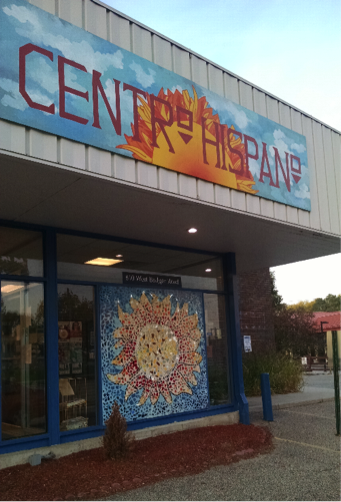






In a room with brightly painted murals of Hispanic heroes, a group of refugees from Bhutan, armed with No. 2 pencils and an eagerness to converse, sits down to begin English class.
All are there to learn, and the air crackled with mental effort.
The one exception was a pupil who sat playing with a scarf and singing a multi-lingual version of “Happy Birthday” to herself, which started in English and gradually tumbled into her native tongue.
This refugee was Trishna, and she isn’t more than 3 years old.
 Centro Hispano hosts refugee ESL classes taught by Literacy Network (Lisa Speckhard/Madison Commons)
Centro Hispano hosts refugee ESL classes taught by Literacy Network (Lisa Speckhard/Madison Commons)
Trishna is the granddaughter of one of the students, and she was there to play. As a child, it is her right to be oblivious to what is going on in the refugees’ world. The Syrian refugee crisis has shifted the national spotlight to U.S. refugee policies making it harder for Madison residents to have the same attitude.
The United States has raised the national cap on refugees from 70,000 this year to 85,000 in 2016 and 100,000 in 2017. This national issue has local impact: Madison received 47 refugees in 2015.
For the Bhutanese refugees in this room, their first challenge is language. Madison’s Literacy Network offers ESL classes at Centro Hispano, an organization that serves Dane County’s Latino population, making the classroom feel like a true “melting pot.”
Gregg Williard, the ESL Group Instructor and Refugee Program Manager, had two volunteers to help him work around the small room and offer assistance to his eager students.
At the beginner table sat Pabi. Outfitted in a purple sweater, green vest and blue Hawaiian print skirt, she set out to conquer her workbook.
Pabi, like most others in the room, is Lhotshampa. The Lhotshampa are traditionally Hindu and speak Nepali, making them an ethnic, linguistic and religious minority in Buddhist Bhutan. In the 1980s, the Bhutanese government began a campaign for “One Country, One People” – and the Lhotshampa did not fit into that definition of “one.” They protested, and the government violently retaliated. They fled, and after waiting in Nepal for 20 years hoping to return home, many Lhotshampa began resettling in the US in 2008.
Pabi arrived in the U.S. in 2012 and is focused on the next phase of her life: mastering English.
“Practice, practice, practice!” she said. “Hard!”
She can express a lot with her face, tone and few English words, including the international practice of bragging about one’s children.
“All married,” she said happily. She has 10 grandchildren, but family reunions are overcast by the knowledge that a brother and sister are still overseas.
While enthusiastic to communicate, Pabi was very aware of the logistical limits of her current grasp on English.
“Hospital no English, doctor – hard!” she said.
The room was filled with a lot of honest tries. Slowly spoken English questions and answers were punctuated with quick Nepali translations.
This cheerful room presented a hopeful picture of refugee resettlement, but in 2012 the Center for Disease Control and Prevention found elevated suicide rates among Bhutanese refugees in the U.S. Almost 20 percent exhibited symptoms of depression and anxiety. The study cited language barriers, the inability to provide for family and stress about family still in their home country as causes.
Once in America, refugees must mourn the loss of their own culture while jumping into a new culture crash-course.
Mary Flynn is the Program Manager of Refugee Resettlement at Lutheran Social Services of Wisconsin and Upper Michigan. The program is one of several that partners with the state of Wisconsin to provide case management and job placement for incoming refugees. It also coordinates volunteer “sponsors,” who can take on a variety of roles from locating furniture for new refugee families to checking in on that family once a week for the first three months.
Resettling is complex, and “we cannot do it all and we need help,” Flynn said. “It’s the little things that have the most power.”
For example, she said, refugees often need help sorting their mail, as they tend to throw out bills and save the Publishers Clearing House newsletter.
The Literacy Network also depends on volunteers like the ones in Pabi’s class, who have their hands full helping five or six students fill out their workbooks.
Lutheran Social Services and The Literacy Network rely on volunteers, and increased quotas will likely mean increased need.
“It’s not enough that we bring people here. Are they going to be here and are they going to be okay?” Flynn asked.
|
|
|
Welcome to the Madison Commons, a website designed to provide news and information about all of Madison's neighborhoods and a crossroads for the discussion of community issues. The name comes from the idea of a village commons, a place for news, talk, debate, and some entertainment, too, that's open to everyone.
All rights reserved. Read more about the Madison Commons and its partners.

